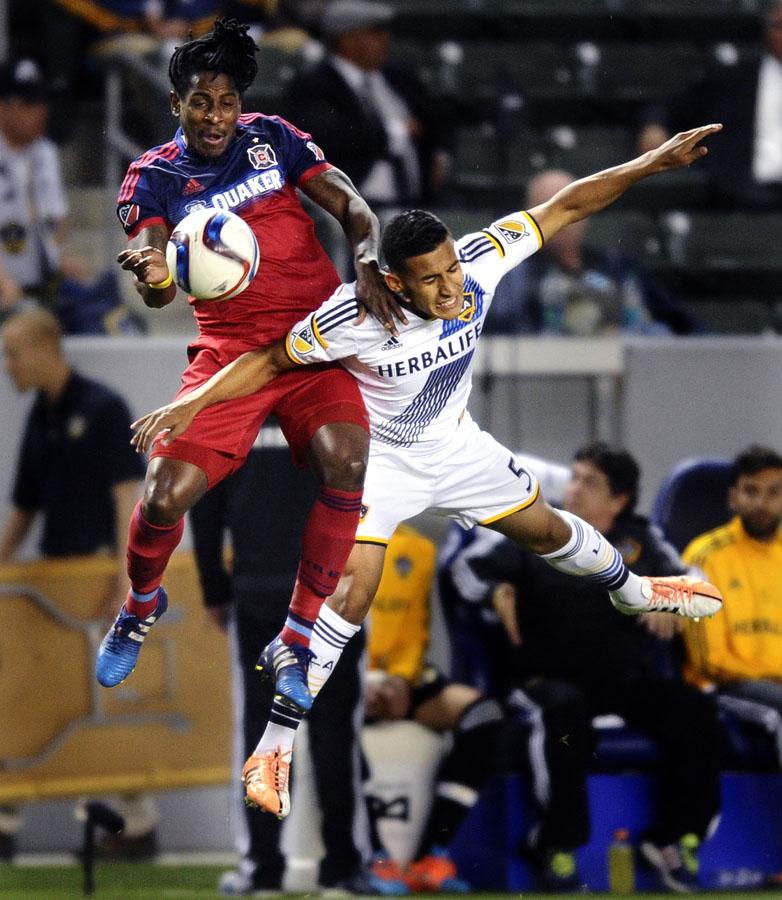Soccer Season Starts
(Wally Skalij/Los Angeles Times/TNS
The Chicago Fire’s Lovel Palmer, left, and the Los Angeles Galaxy’s Jose Villarreal collide while battling for a ball in the first half at the StubHub Center in Carson, Calif., on Friday, March 6, 2015.
Last year, a television broadcast garnered a staggering 1 billion viewers. Was it the Super Bowl? No. It was the World Cup final. Only 2.5% of those viewers were from the U.S.
Soccer is to the world what shopping is to Americans. It’s the world’s dominant sport. All you need is a ball and something to shoot at, and you can play. When a club spends $133 million to acquire a single player, you know things are pretty serious.
In the U.S., things are a bit different. On February 8th, the U.S. Men’s National Team (USMNT) played Panama in a friendly match. ESPN registered about 500,000 viewers for the game, compared to 2.6 million who watched an NBA game on ABC. It’s pretty clear soccer is just not as popular as other U.S. sports.
Prairie Ridge freshman Gunnar Goerges, had some ideas on why this is true. He told us, “Soccer is important on a world scale but not a national scale. Sports are already put a little high up in the U.S. already,” he said. “We like lots of scoring. And the problem is a 90-minute soccer game can end in a tie. It takes some of the fun out of it. And why doesn’t the clock stop?”
But the popularity of soccer is definitely changing. In 2000, the average Major League Soccer game was attended by 13,000 people. This past year, the number was over 19,000. Not only this, total attendance has tripled from 2 million to 6 million.
In fact, Major League Soccer averages more fans per game than the NBA and the NHL, and has the highest growth rate of any major sport in the U.S.
One reason why the change is taking so long is that raw talent hasn’t been available to the U.S. for some time. The U.S. has qualified for every World Cup since 1990, which ended a 40-year qualification drought. Technically the farthest the U.S. has made it was a third place spot in 1930, but most don’t consider it as only 13 nations participated. In recent years, the farthest has been the Quarterfinals in 2002.
This World Cup, while not the best result, was definitely a step in the right direction. The United States was drawn into a very difficult group, facing off against Ghana, Portugal, and the eventual champion nation of Germany. Many thought the U.S. wouldn’t win a single match. But, the U.S. showed up on matchday, beating Ghana 2-1. In the next game, they drew Portugal on a last-minute collapse leading to a goal. Then, Germany. While they lost the game 1-0, they beat out Portugal for the second spot on goal differential. Then they were heartbroken by Belgium 2-1 in extra time. But still, a very impressive finish.
Now, the USMNT has their sights on the 2018 World Cup in Russia. Many of the staples of the men’s national team won’t be there. Landon Donovan, Clint Dempsey, and Tim Howard will likely have retired. But do not fear, a wave of fresh talent has swept the nation. Not only this, seventeen year-old Gedion Zelalem, a striker for English club Arsenal, widely considered to be one of the best prospects in the world, has chosen to represent the U.S. in international play over Germany. Many young players for the U.S. have sprouted up with amazing potential.
Not only this, many European players have begun moving to the American league. Liverpool and England national team legend Steven Gerrard, the most famous Englishman of his generation, has signed a two year contract with MLS side L.A. Galaxy. Many other European stars have been making the switch.
Our own Mr. Brown, counselor and varsity soccer coach gave us his opinion on the matter. “I am definitely an avid fan of the game. I’ll watch English Premier League games…even my satellite radio station is set to a soccer station. Not only do I enjoy watching the games, it helps me learn as a coach, so we can take our game up and hopefully win it all at state this year.”
We also asked him about the opinion of some that there’s not enough scoring in soccer. He responded, “In the NBA the value of a point is diminished. Two points here and there won’t matter. In soccer, the fact that scores can be low sometimes drives excitement. The anticipation that builds up before a goal is something no other sport can offer. Even when there’s a close call, the feeling in that moment is why the game is so popular in other parts of the world.”
We’ve asked some other PR students on how they feel about soccer. Freshman Dan Bruce, gave us some great insight. “Soccer is one of those things you need to gain an appreciation for,” he said. “We don’t realize that in most places around the world soccer is the only major sport there. For little kids in Brazil or Ethiopia … it’s their way of life. So over time, I think we all will gain that appreciation.”
From the students we asked, most agreed with the views of Dan and Mr. Brown. It is still a small sport in the U.S., but it is slowly gaining traction.
The American season begins March 6th when the Chicago Fire take on the L.A. Galaxy.






